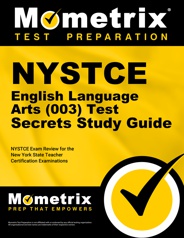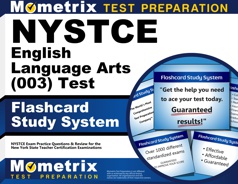The New York State Teacher Certification Exams program (NYSTCE) was designed for teachers in New York State to ensure proficiency in specific educational areas. The NYSTCE English Language Arts exam is designed for candidates entering the teaching field in English.
Click “Start Test” above to take a free NYSTCE English Language Arts practice test, and check out our premium-quality NYSTCE test prep resources by clicking the links below!
NYSTCE English Language Arts Exam Outline
The NYSTCE English Language Arts exam contains 90 selected-response questions and one constructed-response question, and you will be given a time limit of 3 hours and 15 minutes.
The exam is split into nine competencies.
1. Reading Literature (15 questions)
The questions in this competency cover the following topics:
- Analyzing the explicit meaning of a literary text
- Drawing logical inferences
- Citing textual evidence to support conclusions
- Determining the theme or central idea of a literary text
- The impact of an author’s choices pertaining to the development and relationship of elements in a story
- Determining the meaning of words and phrases
- The impact of specific word choices on the meaning, mood, and tone of a text
- How an author’s choices concerning how to frame specific parts of a literary text contribute to its overall structure and meaning
- Techniques such as sarcasm, irony, satire, and understatement
- Foundational works of American literature from the 18th, 19th, and early 20th centuries
- Understanding a wide variety of genres
- Analyzing a particular point of view from a work of literature from outside the United States
- How an author draws on and transforms source material
- How a modern work of fiction draws from ancient myths, traditional stories, or religious works
2. Reading Informational Text (15 questions)
The questions in this competency cover the following topics:
- The explicit meaning of informational texts
- Drawing inferences
- Determining the central idea
- The development and interaction of ideas and events
- Summarizing an informational text
- Determining the meaning of words and phrases used in informational texts
- The effectiveness of the structure an author uses to explain information or develop an argument
- An author’s point of view and purpose
- How style and content contribute to the power or persuasiveness of an informational text
- Evaluating multiple sources of information
- Delineating and evaluating the argument and specific claims in a text
- Assessing the validity of reasoning and the relevance and sufficiency of evidence in an informational text
- Analyzing seminal United States documents and of historical and literary significance
- Analyzing informational texts on topics related to diverse and nontraditional cultures and viewpoints
3. Writing Arguments (10 questions)
The questions in this competency cover the following topics:
- Introducing a precise, knowledgeable claim
- Establishing a claim’s significance
- Distinguishing a claim from alternate or opposing claims
- Logically sequencing claims, counterclaims, reasons, and evidence
- Anticipating the knowledge level, concerns, values, and possible biases of an audience
- Creating cohesion and clarifying the relationship between claims, counterclaims, reasons, and evidence
- Developing a conclusion that follows from and supports an argument
- Developing and strengthening a written argument
4. Writing Informative and Explanatory Texts (10 questions)
The questions in this competency cover the following topics:
- Providing a clear introduction that indicates what is to follow
- Organizing complex ideas, concepts, and information
- Developing a topic with relevant, well-chosen facts, definitions, quotations, and concrete details
- Using appropriate and varied transitions and syntax to link sections of a text, create cohesion, and clarify relationships between ideas and concepts
- Using precise language and domain-specific vocabulary to inform about a topic
- Providing a concluding statement or section that supports the information presented
- Developing and strengthening informative and explanatory writing as needed
- Drawing evidence from works of literature or literary nonfiction to support reflection, research, and analysis
- Using elements and techniques of various genres of literature
- Maintaining a formal style
- Producing clear and coherent writing
- Using technology to produce and publish writing
5. Writing Narratives (10 questions)
The questions in this competency cover the following topics:
- Engaging and orienting the reader
- Using narrative techniques to develop experiences, events, and characters
- Sequencing events to build on one another and create a coherent whole
- Using precise words and phrases to convey a vivid picture
- Providing a conclusion that follows from and reflects upon what is experience and observed over the course of a narrative
- Using elements and techniques from various genres of literature to affect meaning
- Adapting voice and language for a variety of cultural context
- Developing and strengthening narrative writing as needed
6. Researching to Build and Present Knowledge (10 questions)
The questions in this competency cover the following topics:
- Generating a research question
- Narrowing or broadening inquiry
- Gathering relevant information from multiple sources
- Assessing the strengths and limitations of a source in terms of task, purpose, and audience
- Integrating information into a text selectively to maintain the flow of ideas
- Avoiding plagiarism and following standard formatting for citation of sources
7. Speaking and Listening (10 questions)
The questions in this competency cover the following topics:
- Communicating effectively with audiences and individuals from varied backgrounds and perspectives
- Working with group members to promote civil democratic discussions and decision-making
- Advancing conversations by posing and responding to questions that probe reasoning and evidence
- Ensuring that a full range of positions on a topic or issue are heard during group discussions
- Clarifying, verifying, and challenging ideas and conclusions
- Responding thoughtfully to diverse perspectives
- Integrating multiple sources of information presented in diverse formats
- Evaluating a speaker’s point of view, reasoning, and use of evidence and rhetoric
- Orally presenting information and conveying a clear perspective
- Strategically using digital media in presentations to enhance understanding and add interest
8. Language (10 questions)
The questions in this competency cover the following topics:
- Understanding that standard English usage is a matter of convention that can change over time and is sometimes contested
- Commanding the conventions of standard English capitalization, punctuation, and spelling when writing
- Determining the meaning of unknown and multiple-meaning words and phrases
- Interpreting figures of speech in context and analyzing denotative meanings of words
- Understanding the form and use of verbs in various voices and moods
- Understanding general academic and domain-specific words and phrases
- Gathering vocabulary knowledge when determining that a word or phrase is important to comprehension or expression
9. Pedagogical Content Knowledge (1 question)
This competency contains the only constructed-response question, and it is the only question in the competency. You will be given an exhibit of information and be asked to write a 400-600-word response. You will be given instructions regarding the specifics of your written response.
Check out Mometrix's Study Guide
Get practice questions, video tutorials, and detailed study lessons
Get Your Study Guide
Exam Registration
To register for the NYSTCE English Language Arts exam, you will need to create an NYSTCE account online and complete the registration process there. It is recommended that you complete the registration process at least 30 days before you take the exam.
During this process, you will be asked some questions about your educational history, as well as your current education level, first language, matriculation status, and the education code for the NYC Department of Education program type you are associated with.
The examination fee is $122.
Test Day
On exam day, you should arrive at the testing center about 30 minutes earlier than the scheduled exam time to allow time for the check-in process. Once you arrive, you will be asked to sign in and provide a valid form of government-issued photo ID.
Before the exam begins, you will be asked to place all personal items (cell phone, keys, wallet, accessories, etc.) in a locker outside the testing room, or you may be asked to leave them in your car.
Once the test begins, you will be allowed to take breaks. However, the timer will not be stopped during your break, so use your break time carefully.
How the Exam is Scored
Your total score is based on the number of questions you answered correctly, which is then reported as a numerical figure in the range of 400-600. To pass the exam, you must achieve a scaled score of 520.
You should receive your test results roughly 2-4 weeks after taking the exam. When you receive your score report, you will see your total score, your pass/fail status, and your scores for each subarea of the test.
Check out Mometrix's Flashcards
Get complex subjects broken down into easily understandable concepts
Get Your Flashcards
FAQs
Q
How many questions are on the NYSTCE English Language Arts exam?
A
There are 91 questions on the exam.
Q
How long is the NYSTCE English Language Arts exam?
A
The time limit for the exam is 3 hours and 15 minutes.
Q
What is the passing score for the NYSTCE English Language Arts exam?
A
To pass the exam, you must achieve a scaled score of at least 520.
Q
How much does the NYSTCE English Language Arts exam cost?
A
The examination fee is $122.

